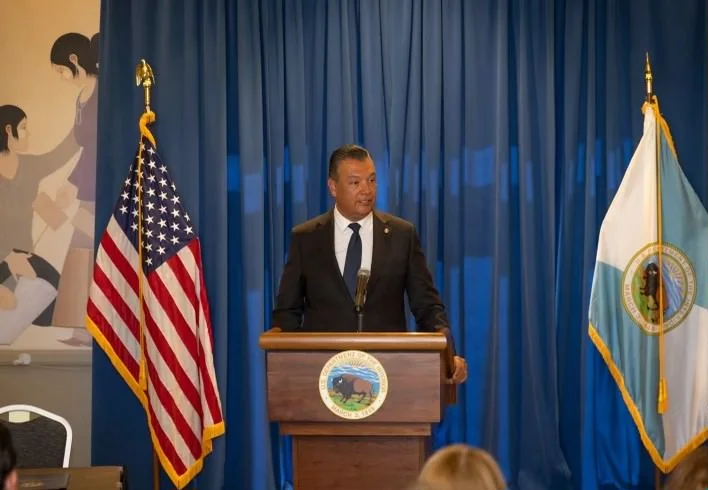Padilla Applauds Critical Agreement and $81 Million for Drought Resilience in California’s San Joaquin Valley

WASHINGTON, D.C. — Today, U.S. Senator Alex Padilla (D-Calif.), Chair of the Environment and Public Works Subcommittee on Fisheries, Water, and Wildlife, joined San Joaquin Valley water authorities and officials from the Department of the Interior to celebrate the signing of a long-term drought plan for south of the Sacramento-San Joaquin River Delta (Delta), as well as an $81 million investment to help implement the plan and strengthen drought resilience. This investment, which comes from the Inflation Reduction Act, will help safeguard crops during drought years, provide critical water supply to refuges and cities south of the Delta, and protect the San Joaquin River by carrying over water from wet to dry years.
Seasonal shifts in water availability and worsening droughts have limited operational flexibility and increased regulatory uncertainty. Through the new drought plan, South-of-Delta water users who rely on the Bureau of Reclamation’s Central Valley Project will share a portion of their wet water year supplies for use in the driest years. The plan provides major benefits both to farmers and to salmon in the San Joaquin River, California’s second longest river.
The signatories of the South-of-Delta drought plan included Bureau of Reclamation Commissioner Camille Calimlim Touton and representatives from the San Luis & Delta-Mendota Water Authority, Friant Water Authority, and San Joaquin River Exchange Contractors Water Authority.
“This vital agreement won’t just benefit the agricultural water users south of the Delta; it’s also going to help address our communities’ drinking water needs, protect our wildlife refuges, and improve the future resilience of the San Joaquin Valley, including the farms that help feed the nation,” said Senator Padilla. “As we confront increasingly extreme weather and severe droughts, this investment demonstrates that the Inflation Reduction Act is delivering on our promise to alleviate longstanding water challenges with creative solutions.”
“Today’s announcement reaffirms our commitment to building more resilient communities from the impacts of drought and climate change in the basins in which we operate, and including in the California Central Valley,” said Reclamation Commissioner Camille Calimlim Touton. “This funding from the Inflation Reduction Act demonstrates the Biden-Harris administration’s investments South of Delta to implement projects that will safeguard our water supplies and restore the San Joaquin River ecosystem for future generations.”
“Today’s announcement is a positive step forward to improve climate resilience for the urban and rural communities, wildlife and wildlife enthusiasts, and agricultural productivity that the Water Authority’s member agencies support,” said Federico Barajas, Executive Director of the San Luis & Delta-Mendota Water Authority. “This partnership — coordinated between the federal government and south of delta water users and supported by leaders in Congress — and associated funding award will allow us to implement projects to improve our ability to manage water supplies across the dry years we know will come. This year’s allocation highlights the water supply reliability challenges that impact our members across all year types and further reinforces the need to develop proactive solutions to improve reliability. Today’s announcement advances one such solution and establishes a framework for south-of-delta water users and Reclamation to work together to improve outcomes for the San Joaquin Valley.”
“As water operations certainty continues to decrease, and once reliable supplies become less so, it’s critical for water agencies and water managers to work together to find creative ways to meet our common goals,” said Jason Phillips, CEO of the Friant Water Authority. “The agreement between our neighbors in the Valley, the San Luis & Delta Mendota Water Authority and the San Joaquin River Exchange Contractors Water Authority, as well as our partners at the Bureau of Reclamation, will help bring some predictability to water allocations and will help to provide certainty for the farms and communities we represent. These efforts and outcomes are not easily achieved, but are a welcomed development and hopefully a sign of more partnering in the future.”
“It is critical that we not only continue to invest in new infrastructure to capture and store water to prepare for future dry years, but that we also work collaboratively to make the most of the resources we currently have. This agreement marks a new level of cooperation that will help mitigate the impact of droughts on urban, agricultural and environmental water users in our region and advance the goals of the San Joaquin River Restoration Program while maintaining water rights. We appreciate Senator Padilla’s leadership to make this announcement a reality, our partner agencies for their collaboration, and the Bureau of Reclamation for their commitment and resources for this effort,” said Chris White, Executive Director of the San Joaquin River Exchange Contractors Water Authority.
To realize the benefits of the drought plan, the water contractors, in collaboration with Reclamation, have identified a number of critical infrastructure projects that are key to successful implementation. Specifically, the Inflation Reduction Act will fund projects to establish additional aquifer storage, recharge and recovery wells, re-operations of existing surface storage, and conveyance capacity expansion.
Senator Padilla worked to ensure that the Inflation Reduction Act included $4 billion to help regions across California experiencing severe drought. He secured $428 million in investments in the San Joaquin Valley from the Bipartisan Infrastructure Law. Padilla also secured funding earlier this year to help the Knightsen Wetland Restoration Project in Contra Costa County restore 645 acres of habitat and to support the Sacramento-San Joaquin Delta One Water Initiative to promote holistic, sustainable, and inclusive water management in the Delta.
###